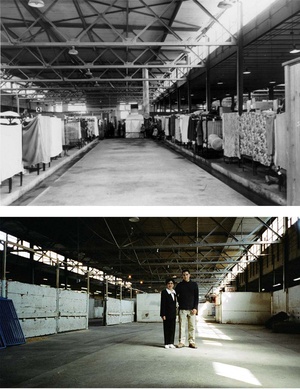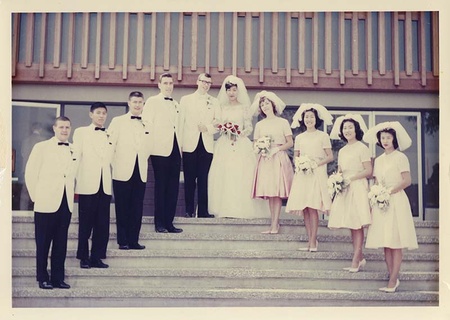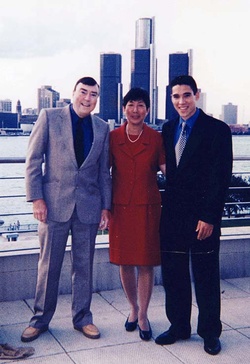Read part 1 >>
It seems to me that the film honours Nisei but is aimed mostly at Yonsei. Did you have this intention?
Absolutely. Besides providing an overview of the internment the subtext of the film is to drive home the fact that we all should make the effort to do what we can to document and share the experiences of our predecessors with others. Allowing audiences to get a sense of what “the other” is all about is a great way to fight discrimination; that’s what this whole experience has been about for me.
What kind of response are you getting from Yonsei?
Those that have contacted me have been very excited about speaking with their own families, and documenting their own oral histories. Many Sansei mentioned that they regret that they had never shown curiosity when their parents were alive, or that when they did, their parents would refuse to discuss their experiences during the war years.
Any other kinds of response?
On the flipside, after the screenings at the JCCC I have encountered several Nisei that have noted that their families have suddenly been showing a lot more interest in their heritage, and they are happy to take their relatives on “tours” of their photos and memorabilia. Also following the gala screening, a friend of mine who is of Jamaican descent, booked a trip to London, England for her week off to spend time speaking with her grandmother, who is ill. She has been debating whether or not to make the trip for some time, but after seeing the film she told me that it was a trip that she had to make. She’s planning to document her conversations as well. That type of reaction has been wonderful.
Anything else?

Chris and his grandmother standing in Hastings Park only steps away from where she slept while she was there. The above photo, taken during the internment, is the same location. (Photo courtesy of Chris Hope)
An interesting point that came from someone that spoke with me after the gala; I regret that I can’t recall their name—it was a great point that I hadn’t considered. My family’s displacement experience was uniquely diverse. As a result of my using their first-person experience as the guiding thread for the film, many aspects of the displacement experience are covered “up close and personal,” making the film more valuable as an historical overview of the experience for the community.
For instance: The women’s experience at Hastings Park is covered through my grandmother’s revisitation to the spot that her bed was in there; the road camp experience is documented through my grandfather’s photos, diary, and my grandmother’s perspective on what actually happened in the camp; the high personal costs of the loss of medical treatment/access for internees is exemplified with my grandmother’s brother’s story; and “repatriation” to Japan is well documented through my grandmother’s brother’s story.
What kind of sense does your mother have of being sansei and Japanese Canadian?
She definitely has a strong sense of being “different”. To this day I cringe when she is often asked on being introduced to people when the last time she was “back” to visit Japan. My grandmother has only visited to Japan twice (the second was with me to reunite with her brother), and my mother has never set foot in Japan. I’m sure that’s the case with many Sansei and, as with my grandmother, with many Nikkei. The family foods my mom cooks harken back to the “Japanese Canadian” vs “Japanese” tradition. Going through the Japanese-Canadian cookbook “Just Add Shoyu” is like turning the pages on many fondly recalled “Japanese” dinners cooked for intrigued dinner guests of non-Japanese descent. Our family has a huge sentimental attachment to that cookbook as a result; it’s a validation of the unique cuisine that my mom grew up with and was taught to prepare.
I always find it neat to watch as my mom meets other Sansei. They’re always about three sentences away from discovering that they’re “cousins” several times removed it seems. Sansei identity really does seem to be a membership pass to a close family. I feel like Yonsei identity is somewhat the same, but we’re less familiar as a group as to who the members of our “family” are.
How does your father’s ethnic heritage affect your Nikkei one?
As a curious third party familiar with his own English and Irish roots, my dad really helped to highlight subtle Japanese Canadian cues when he joined the Okura family. Because he passed down the stories that had been told on his introduction to my mom’s family, I feel like he was, at one time, like a UN ambassador interpreting Japanese Canadian culture; and in particular, the Japanese Canadian experience, for me. Because the English and Irish traditions are fairly well known versus the JC story that wasn’t really discussed, I think my dad spent more time actively preserving our JC history because he perceived it as the rarer of our two family histories.

His parents' wedding party standing on the front steps of the JCCC on July 11, 1964 (Photo courtesy of Chris Hope)
© 2012 Norm Ibuki






